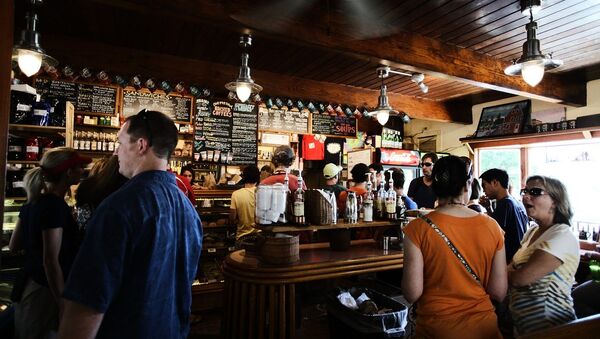Dr Eric Carlin, Director of the Scottish Health Action on Alcohol Problems at the Royal College of Physicians of Edinburgh and Professor Peter Anderson from the Institute of Health and Society at the University of Newcastle share their views on the issue.
Sputnik: A study published by the British Medical Journal has revealed that the introduction of minimum pricing for alcohol in Scotland appears to have cut drinking. How significant is this research and are the results really that surprising?
Dr Eric Carlin: It's very significant minimum unit pricing was implemented in May last year.
It's the first study that has given us a breakdown, so we can actually kind of have an idea of what's happening within the market, what it seems to indicate is that the initial results are that its having precisely the impact that it is supposed to be having in terms of affecting the people who are drinking the most alcohol, disproportionately affecting poorer people who are drinking the most alcohol and who are most likely to end up in hospital and die as a result of that and not affecting the rest of the population very much at all which is great.
Peter Anderson: This is really quite a new significant finding.
As we all know back in May last year, the beginning of May 2018, Scotland introduced the minimum unit price and what we've been able to do is to look at what has happened to people buying alcohol and what we found was that before the introduction of minimum unit price, each adult in Scotland on average, was buying about 15 drinks a week and then with the instruction of minimum unit price they dropped that purchase by over one drink a week.
Sputnik: With more research being published around the success of minimum unit pricing; could we see other parts of the UK adopt this policy as cases of alcohol-related deaths rise in countries like England?
Dr Eric Carlin: I think one of the thing to say is having said all those fantastic things about this stuff it's important to take on board that this is one study and the minimum pricing legislation that was implemented in 2018 has what they call a 'sunset clause', which means that there will be a thorough evaluation conducted by NHS Health Scotland over a period of years which will report in 2023. From the government will decide whether to continue with the policy or not.
I think it's really important that we do of course pay attention to studies that are coming out in that period of time but in terms of knowing overall what the overall impact of the policy is and all the areas that is supposed to impact I think we do have to be wary about drawing too many conclusions from short term studies.
Peter Anderson: We think that the findings are strong enough to recommend this policy should be adopted elsewhere. In the UK, Wales is planning to introduce minimum unit price next year in 2020.
England over the last year has discussed this a lot of times, in fact, they there was going to be a plan to introduce a minimum unit pricing in England but then there was a U-turn and the idea got shelved. We hope this data will give more support to the arguments to do that.
But of course it's not just the United Kingdom - this could be done in other countries. I think what Scotland has done its sort of lead the way and shown that it's possible and shown with this data has shown that it really does have an impact.
Sputnik: What effect is this policy having on pubs, bars and venues at a time when nearly 50 percent of licensed venues in Britain have folded over 10 years?
Dr Eric Carlin: My organization is SHAAP (Scottish Health Action on Alcohol Problems) actually called for minimum unit pricing in 2007 - we were the first organization to say that this was going to be important.
We're up against big business interest in relation to these evidence-based policies. There's been substantial investment in healthcare and in what we called alcohol peace interventions - that's mainly in primary care settings; doctors and primary health care staff being aware of signals that people might be having an alcohol problem when even when it's not actually being reported; and proactively raising that and raising discussion. I think those kind of interventions have been really important.
We definitely need more support for more investment and treatment and we definitely need more investment in building links between recovery communities but also using some of the long standing groups, which are there already, so linking with Alcoholics Anonymous groups which have a network across the country and who have been significant as well in saving people's lives.
Peter Anderson: I don't think so.
I mean you're right that the UK and in fact the further north you go the stronger the culture is about drinking but this culture is going to stay there and this change is not a huge change but nevertheless, it's a change that brings health benefit to people and that's what its value is.
By introducing a minimum unit price you're not going to demolish the pub culture with a drinking culture.
You're just going to make that culture a little bit more sensitive to the health issues. Minimum unit pricing if you like it's a sort of signal saying: look if you drink too much that is important for your health.
You need to take notice of it and here are some of the environmental things that can be done to help you make some decisions that are going to be healthier for you.




